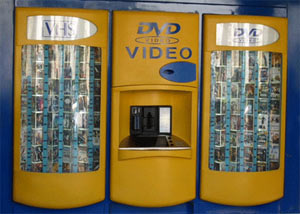Article
The next generation of DVD rental?
Kiosks are taking aim at the titanic movie rental industry. But will their convenience and low prices be enough to woo consumers away from a leisurely stroll through the aisles of a rental store?
June 14, 2005 by James Bickers — Editor, Networld Alliance
By any account, the DVD format has been one of the most successful rollouts in technology history. According to the Digital Entertainment Group, DVD players can be found in more than 73 million U.S. households - and 46 percent of those families own more than one player. The group estimates that 80 percent of U.S. households will have at least one DVD player by the end of 2005.
Given the small size and durability of the discs, not to mention their staggering storage capacity and the ability to offer extras unimaginable in the era of VHS tape, they've become the darling of the movie rental business. DEG estimates that DVD rental revenues totaled $5.7 billion in 2004, up more than $1 billion from the year before.
That's a lot of entertainment dollars being spent, and several kiosk companies are aiming at making an inroad into the rental business.
 This story and all the great free content on KioskMarketplace is supported by: St. Clair Interactive Communications, Inc. St. Clair Interactive Communications, Inc. is an industry leader in kiosk software for applications, remote operations, and content processing.  |
The automated rental shop
While a kiosk might not be able to offer its customers the sprawling title selection of a 10,000-square-foot retail store, it can offer convenience and lower prices. According to ELO Media's Oren Hon, those are both key factors driving the company's rental unit.
"The time it takes to find a movie and rent it in a conventional store can range from 5 minutes to 15-20 minutes if there is a line at the cashier, as there generally is on a Friday night," he said. "At the machine, it would take about 60 seconds, depending on how much time you spend browsing for movies."
Hon said that his machines should ideally be placed in high-traffic areas that are conducive to impulse buys, such as gas stations, supermarkets, shopping centers and mass transit stations. Rented films are delivered in special packaging that expedites the return process; the unit also allows purchase of new DVDs in their original retail boxes.
According to Donald Blust, chief executive officer of Touch Automation, rental kiosks have an additional boon over the traditional rental stores: You can rent a movie from one kiosk and return it to a different one (provided both machines are run by the same operator).
"RFID makes all of that possible and frankly, with the right systems in place, it's easy," he said. "I don't think any of the video store chains today are even thinking of permitting that kind of inventory cross-pollination in their traditional environments."
Both companies have emulated the "all you can watch" model pioneered by online services like Netflix, in which a monthly membership fee lets consumers check out two or three movies at a time, and keep them for as long as they want. According to Hon, ELO is working on a queuing system, also reminiscent of the online services, that will allow members to reserve titles for up to two hours at the kiosk.
 |
ELO Media's DVmatic kiosk, which dispenses both rental discs and new movies for sale |
"Most movie renters are impulse customers who do not plan to watch a movie two or three days in advance," he said. "Our goal for them is to come to our machine while they shop for groceries, fill up on gas, or go to the local Laundromat."
Both men said their products compete with the traditional rental stores on price, too: Hon said most locations start with a daily rental rate of 99 cents, while Blust said his company's prices average 25 percent lower than large chains.
If DVD rental kiosks find their niche, they represent an attractive business opportunity for entrepreneurs well versed in traditional vending. New titles are generally released to retail on Tuesdays, which means the machines need to be restocked just once per week. Both companies said that when a disc is returned to a machine, it is automatically put back into the inventory and is immediately available for the next renter.
And if all that isn't enough, consider the Golden Arches. McDonald's, hot on the heels of its successful DVD rental kiosk pilot, announced that it will expand the program from 100 locations to more than 1,200 by the end of the year.
The dissenting voice
Geoffrey Kleinman, editor of industry watchdog Web site DVD Talk, isn't so sure that DVD rental kiosks will live up to their expectations. He said that choosing a movie inherently involves too many choices to make it work at such a console.
|
"When someone goes to an ATM, there is very little choosing that they have to do," he said. "They're there for generally one purpose and that is to get money. Also, banks make it very easy (to not have to make choices) by only dispensing select monetary amounts. Imagine how much more time we'd spend (at the ATM) if we had to designate exactly what denominations we'd like our money to be in."
This is the rub for most skeptics of the DVD rental kiosk - with the hundreds of thousands of movies available, most consumers view a trip to the rental store as a browsing experience. Even if they have one title in mind when they walk in the door, they often emerge with one or two more, films that caught their eye while they were leisurely browsing the aisles.
"With packaged media, and especially with DVD, there's a physical browse experience that goes on with the consumer that very few are looking to replace," he said.
Kleinman said that he sees the kiosks becoming more valuable in the sale of new DVDs than rental - particularly if they are placed in high-traffic locations and are stocked full of new releases at low prices. "For many, they'd save a trip to a big box retailer like Best Buy or Costco for purchasing popular DVDs, enable more spontaneous buying and provide a high opportunity for the `nag factor' from kids," he said.
Kiosks might not put Blockbuster or Netflix out of business, in other words, but they don't have to. Given the size of the DVD rental and sale pie, even a thin slice represents a windfall for the newly emerging segment.












